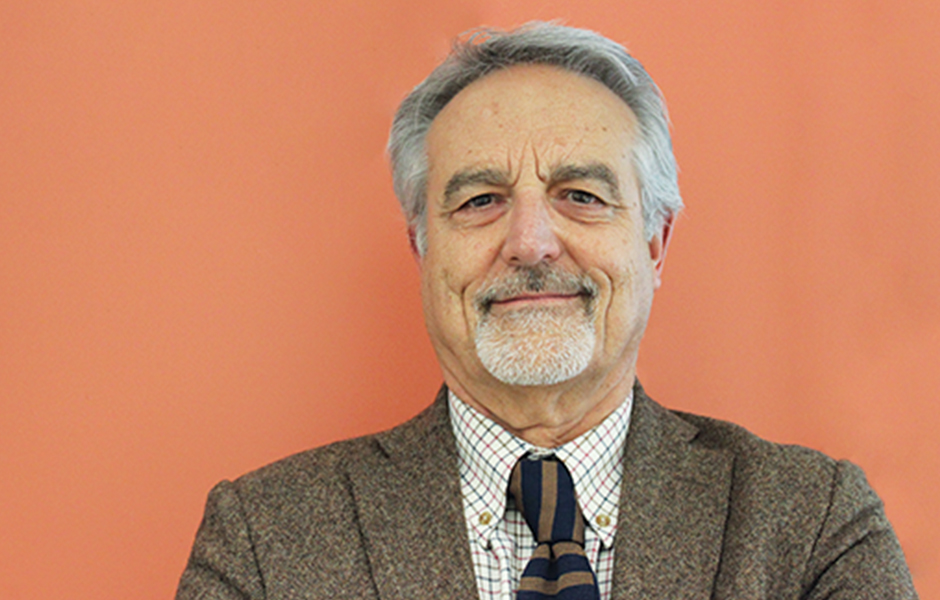He is from Alentejo, a fully and wholeheartedly professor, a free-spirited politician, a leader with decades of experience in various educational institutions. He is also a practicing Catholic, father of 3 and a great cook. At 69, José Manuel Silva is an integrated researcher at CINTESIS – Center for Health Technology and Services Research, leading a project in the area of formal and informal care from the School of Health Santa Maria, where he has served as director for six years.
José Manuel Silva was born in Redondo, Alentejo, in 1950, but went to Lisbon at the age of 9 to take the high school entrance exam. He spent many years between Évora, Redondo and Lisbon, and later between Torres Novas, Boston, Leiria and Spain. “My roots are in Alentejo, but I’ve always been everywhere, I’m a citizen of the world. As my mother said, our land is where they treat us well,” he says.
He was always politically active, since his teenage years. He was a member of the Portuguese Communist Party (PCP). In the distance, he recalls this relationship as a “friendship with benefits” and says he had “a romantic view” of the world. More than a party activist, he has always been a “cause activist”, without abdicating intense union activity and social intervention.
At 19, I was already working. In the military service, he took a course that eventually opened the doors of his career in education. In 1974, he was already teaching physical education. At only 25 years old, he was appointed to run a company with about 400 employees.
He wanted to be a sociologist or anthropologist but he eventually graduated in History from the University of Lisbon. He taught at the Secondary School Maria Lamas in Torres Novas, where he was the director of the Museum and the Municipal Library. From 1983 to 1985, he headed to Boston, USA, to study a master in Educational Sciences. Upon his return, he was one of the founders of the School of Education of Leiria, an integrated institution of the Polytechnic Institute of Leiria.
He was city councilor of Leiria for the Socialist Party, municipal deputy and president of the Municipal Assembly. He was also the Center’s regional director of education from 2005 to 2006, but he confesses that he felt disillusioned and “done”. “I’m a free-spirited person,” he says.
He stood down from the position to embrace the challenge of pursuing a postgraduate degree in Strategic Direction from the Polytechnic University of Catalonia and a Ph.D. in Educational Sciences at the University of Extremadura (Spain) with a thesis on school leadership, which he completed in 2009.
Back in Leiria, it was time to submit the retirement request. It was 2012. One fine day, he opened the newspaper Expresso and found a manager job ad to work at a higher education institution in Porto. “I sent the application. A few days later they called me for an interview. I found a fantastic challenge. Running schools is what I know how to do and have done for many years. Besides, I like to be where I can be useful,” he says.
He accepted the position of chairman of the ESSSM Governing Board in 2013, having invested in a number of fronts, including investigation. In search of a boost in this area, he joined CINTESIS in 2017, along with other researchers from his institution. “I am not a pure academic. Research interests me for instrumental reasons because I like to get to the bottom of the issues,” he says.
He is currently a member of the board of the Portuguese Association of Private Higher Education (APESP) and of the Advisory Council of A3ES. He is also principal investigator of the ICAVI project, in the area of formal care, which aims to study the organization model of an Independent Life Support Center (CAVI), in a partnership between CINTESIS, ESSSM, the Portuguese Neuromuscular Association (APN), and the Caregivers Portugal, of which he is president and founder. He is also involved in a project by the Organization for Economic Cooperation and Development (OECD) on the development of critical thinking in higher education students, with over thirty institutions in different countries.
In personal relationships, he says he couldn’t care less about “titles” and he treats everyone with equity. But education is not the same as modesty, he stresses, especially when it comes to leadership. Although he has left active politics, he does not shy away from saying what he thinks in the media (he writes for the Observador and the Jornal de Leiria) and social networks.
1-Year Ambition
In terms of research, one year ago we wanted to consolidate the activity of the School’s research center, make our CINTESIS link more robust and take advantage of material and human resources to go further.
10-Year Ambition
Making 10-year predictions is difficult. My ambition is for the ESSSM to grow, strengthen and respond to a society with ever-increasing levels of longevity. Our strategy is to train professionals who fully match the needs that arise from it. In terms of research, we want to be a reference in this area, with a focus on formal caregivers, who must be highly qualified professionals and should play an increasingly important role in society.
Life Beyond Management and Research
In my free time, I love to cook and without false modesty, I cook well. My cuisine is based on Alentejo dishes and traditional Portuguese cuisine. I make an excellent fish soup and love to make roast lamb, as it should be, with potatoes or with a vinegar salad, very typical of the Alentejo. Now I am specializing in strudel . I like to make dinner parties for friends. They usually brag about everything I cook [laughs]. Besides that, I dedicate myself to reading, I still like politics very much, I am very involved in social networks.

